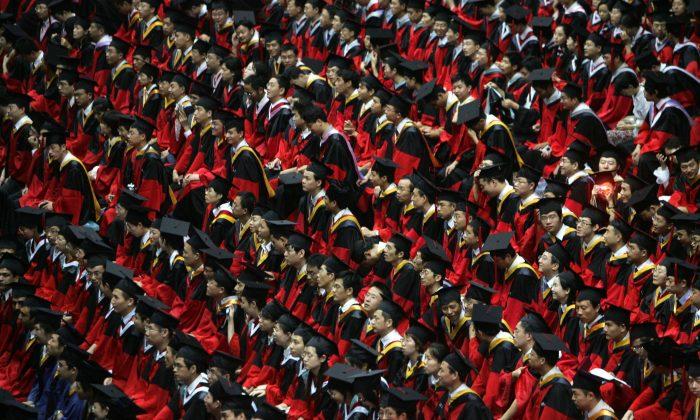The Chinese Communist Party (CCP) is tightening its grip on universities—domestic and abroad.
Within its borders, a recent directive from the Ministry of Education is requiring all foreign-funded universities to establish party organizations on campus, according to a Financial Times report published on Nov. 19, citing anonymous sources briefed on the new rules.
About 2,000 foreign-funded universities have established a presence in China, since the country allowed education joint ventures with local partners in 2003. Several American universities have campuses or education partnerships in China, such as New York University in Shanghai, Columbia University in Beijing (in collaboration with Tsinghua University), and University of Pittsburgh in Shanghai and Chengdu City, Sichuan Province (in collaboration with Sichuan University).
All education joint-ventures in China must now create a Party unit, which will monitor school operations and have a say over important administrative tasks, according to the Financial Times report. Each organization’s Party secretary will be given vice-chancellor status and a seat on the board of trustees.

A crowd gathers in front the Hebei Academy of Fine Arts campus after a graduation ceremony in Xinle City, Hebei Province on June 16, 2015. Fred Dufour/AFP/Getty Images
The directive follows recent news of tightening control over foreign firms, as well as popular tourist sites, in China, via Party organizations. All companies operating within the country are required by law to create such Party branches, which can take part in decision-making to make sure the company’s activities are in line with the Party’s policies.
Party at Home Abroad
Meanwhile, CCP members who are studying abroad in the West have even begun establishing Party branches overseas.A visiting scholar from China currently based at University of California (UC), Davis recently decided to create a Party branch on campus, inviting other CCP members studying at the school to join him, according to a report by Radio France Internationale on Nov. 20.

A man walks near a giant image of the Chinese national flag on the side of a building in Beijing, on October 23, 2017. Greg Baker/AFP/Getty Images
The Chinese academic invited other scholars who were also currently based at UC Davis, who are professors at seven Chinese universities: Tsinghua University, Zhejiang University, Dalian University of Technology, Beijing Institute of Technology, Jiangsu University, Nanjing Agricultural University, and Hohai University. The news was first posted on the campus news website of Dalian University of Technology, but was later deleted.
The initial news report said that the group held a meeting on Nov. 4 to discuss the 19th National Congress, the major Party conclave that concluded in October. The scholar who started the organization said he wished to promote the Party branch to his Chinese colleagues and neighbors and hoped to recruit more members, with the hopes of organizing activities every two weeks to discuss Party ideology.
When Hong Kong newspaper South China Morning Post later contacted the founder of the party branch, Mu Xingsen, to confirm its establishment, the visiting scholar said the organization had already been dissolved. “It is because we have later learned that this [establishing a party branch] does not comply with the local laws,” Mu told the newspaper.
U.S. federal law requires that foreign individuals working in a political capacity for a foreign government must disclose their activities to the U.S. federal government.





